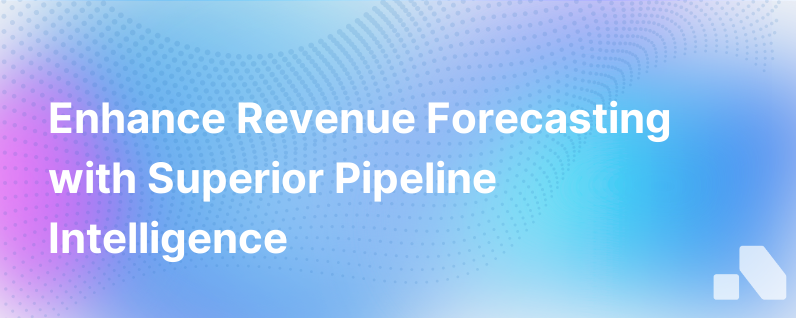
Improving revenue forecasting is a fundamental concern for B2B sales leaders, involving a deep grasp of all sales opportunities on the horizon. Accurate revenue forecasting depends on robust pipeline intelligence—the detailed knowledge and data encompassing your sales pipeline. Think of pipeline intelligence as a powerful radar system within your CRM, capturing every blip (opportunity) and providing insights to help you predict, with high precision, your sales outcomes.
In this discussion, we'll dissect how stronger pipeline intelligence can significantly enhance your revenue forecasting, and thus bolster your business strategy and execution.
Understanding Pipeline Intelligence
Pipeline intelligence refers to actionable insights drawn from analyzing the data of your sales pipeline. It's a comprehensive look into the deals you expect to close—what's in the pipeline, the stages those deals are in, and the progress they are making. Improving pipeline intelligence involves gathering data-driven insights into buyer behavior, deal velocity, and sales activities.
Sales leaders invest in gaining granular details across multiple dimensions, such as:
- Deal stages: The specific phase every deal is in your sales process.
- Deal value: The size of every deal, often linked to the potential revenue impact.
- Sales activities: The number and type of interactions with prospective buyers, including meetings, emails, and calls.
- Lead sources: The origin of your leads, valuable for channel optimization.
- Sales cycle length: The time taken from initial contact to deal close.
- Win rates: The ratio of deals won to those lost.
- Historical data trends: Past performance as a predictor of future results.
Why Better Pipeline Intelligence Matters
The accuracy of revenue forecasting can be the difference between exceeding quarterly targets and missing out on growth opportunities. Here’s why having a pulse on your pipeline intelligence is crucial:
- Strategic Decision Making: With precise forecasts, executives can make informed decisions about investments, budgeting, and strategic directions.
- Resource Allocation: Sales leaders can more effectively distribute resources, like support for bottlenecks in the pipeline that impede deal closures.
- Risk Mitigation: Identifying potential shortfalls early on allows for corrective actions, mitigating the risk of not meeting the forecasted revenue.
- Performance Improvement: Accurate forecasts enable the assessment of sales team performance and individual contributions against quotas.
Steps to Enhance Pipeline Intelligence
Enhancing your pipeline intelligence isn’t just about more data; it’s about better data and sharper analysis. Here’s how you can hone your revenue forecasting with refined pipeline intelligence:
-
Automate Data Capture: Use CRM tools to automate the capture of relevant data. The less manual entry required, the fewer chances for errors, ensuring that your forecasting relies on clean and accurate data.
-
Implement Regular Pipeline Reviews: Conduct weekly or bi-weekly pipeline meetings with your sales team to review and validate your pipeline data. These reviews should foster insight into deal progress and potential roadblocks.
-
Adopt Predictive Analytics: Moving beyond descriptive analytics (what happened) to predictive analytics (what could happen) is key. Embrace Machine Learning and AI algorithms to analyze past sales data and identify patterns that can help predict future outcomes.
-
Enforce Sales Process Discipline: Standardization of the sales process ensures that data across reps and teams is comparable and aggregable. Emphasize stage definitions so that forecasting is based on consistent criteria.
-
Refine Lead Scoring: Fine-tuning your lead scoring model will improve the quality of opportunities entering the pipeline. Better-qualified leads lead to more predictable deal progressions and outcomes.
-
Accentuate Deal Qualification: Train your sales reps on rigorous deal qualification methods. Strong qualification ensures that only genuine opportunities with a good chance of closing are reflected in the forecast.
-
Establish Feedback Loops: Integrate feedback mechanisms for sales reps to report back on pipeline activity and health. Use this information to constantly refine forecast algorithms and assumptions.
-
Invest in Training and Development: Equip sales teams with the latest tactics and tools to improve their pipeline management—knowledge that can be applied to enhance forecasting accuracy.
-
Blend Quantitative and Qualitative Insights: Numbers alone won’t tell the whole story. Enrich your pipeline data with qualitative insights from customer interactions and competitor activities.
-
Consult with Other Departments: Interdepartmental collaboration can provide additional context for revenue forecasting. For instance, product development timelines and marketing initiatives can impact sales outcomes.
Conclusion
Incorporating stronger pipeline intelligence isn't just about improving numbers; it's about wielding that intelligence to build a resilient sales strategy that weathers uncertainties. By deploying smarter data practices, training, technology, and sales rigor, you can transform your pipeline from a murky forecast into a clear barometer of your sales health.
As sales teams harness the full potential of pipeline data and predictive analytics, they can transition from guesswork to governance in their revenue forecasting. Investing in these areas brings more than forecasting efficiency—it infuses a culture of data-driven decision-making throughout the organization.
For those seeking an even sharper edge, platforms like Aomni offer powerful AI tools that capture real-time account research, competitive insights, and personalized sales content—delivering a fresh level of pipeline intelligence to enhance revenue forecasting without the manual toil. With everything on the line in B2B sales, can your startup afford anything less?